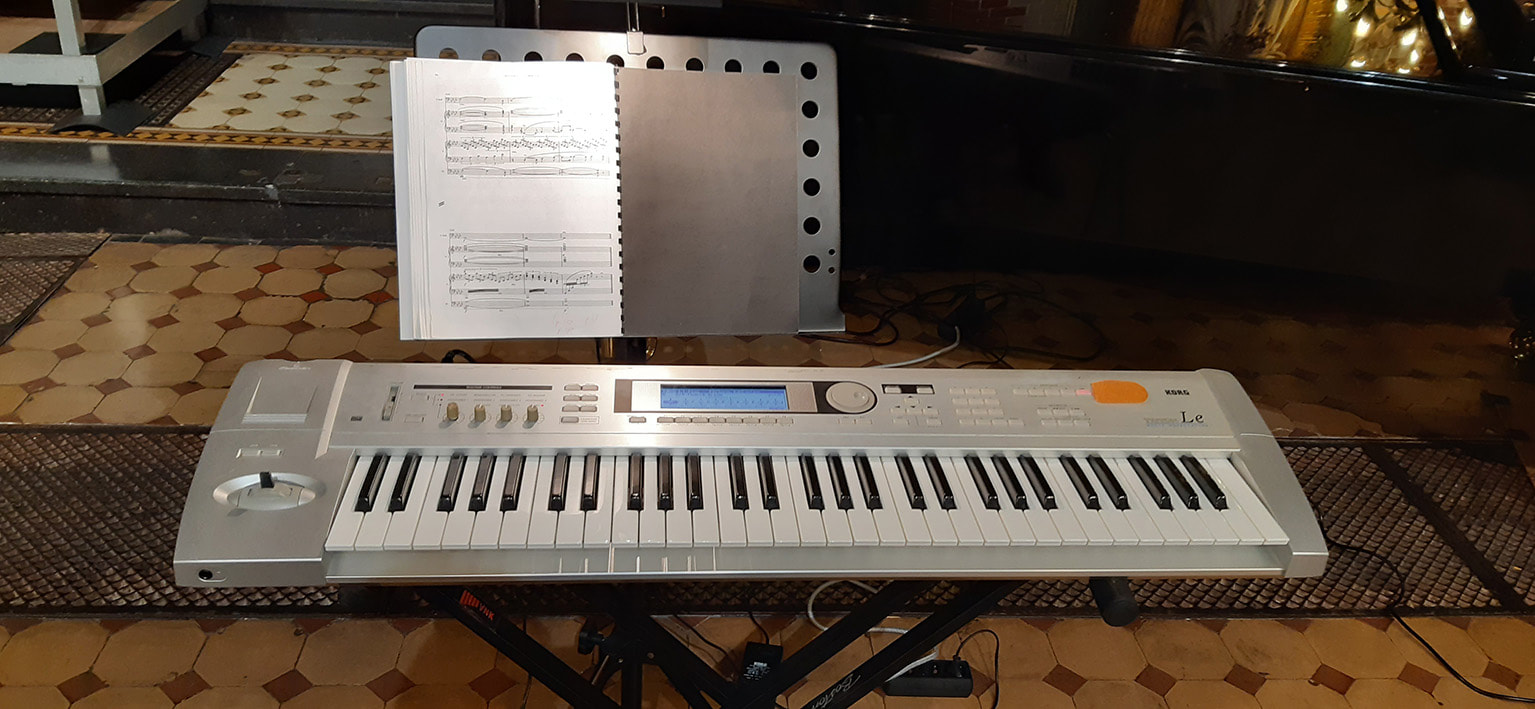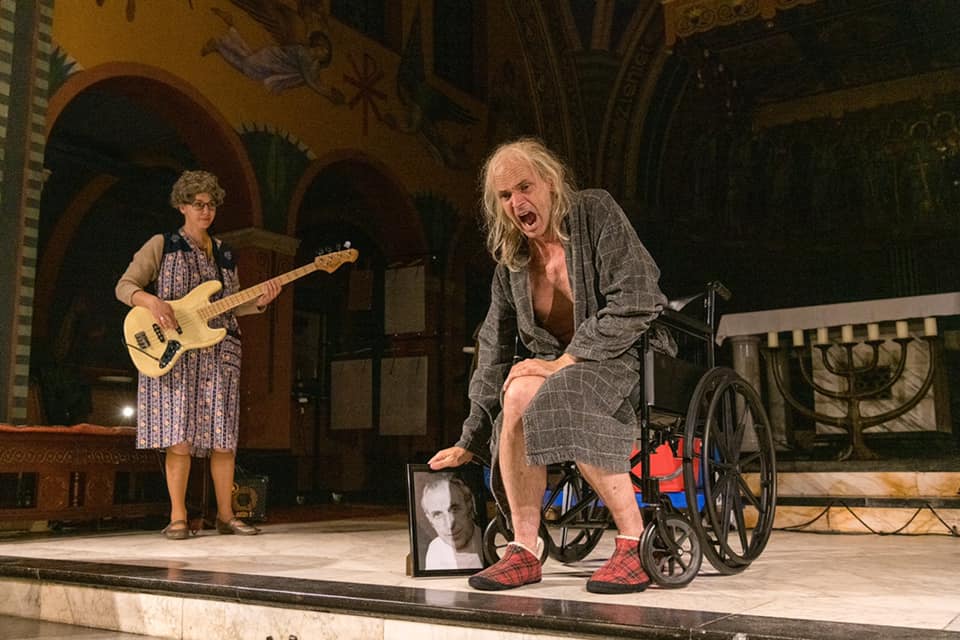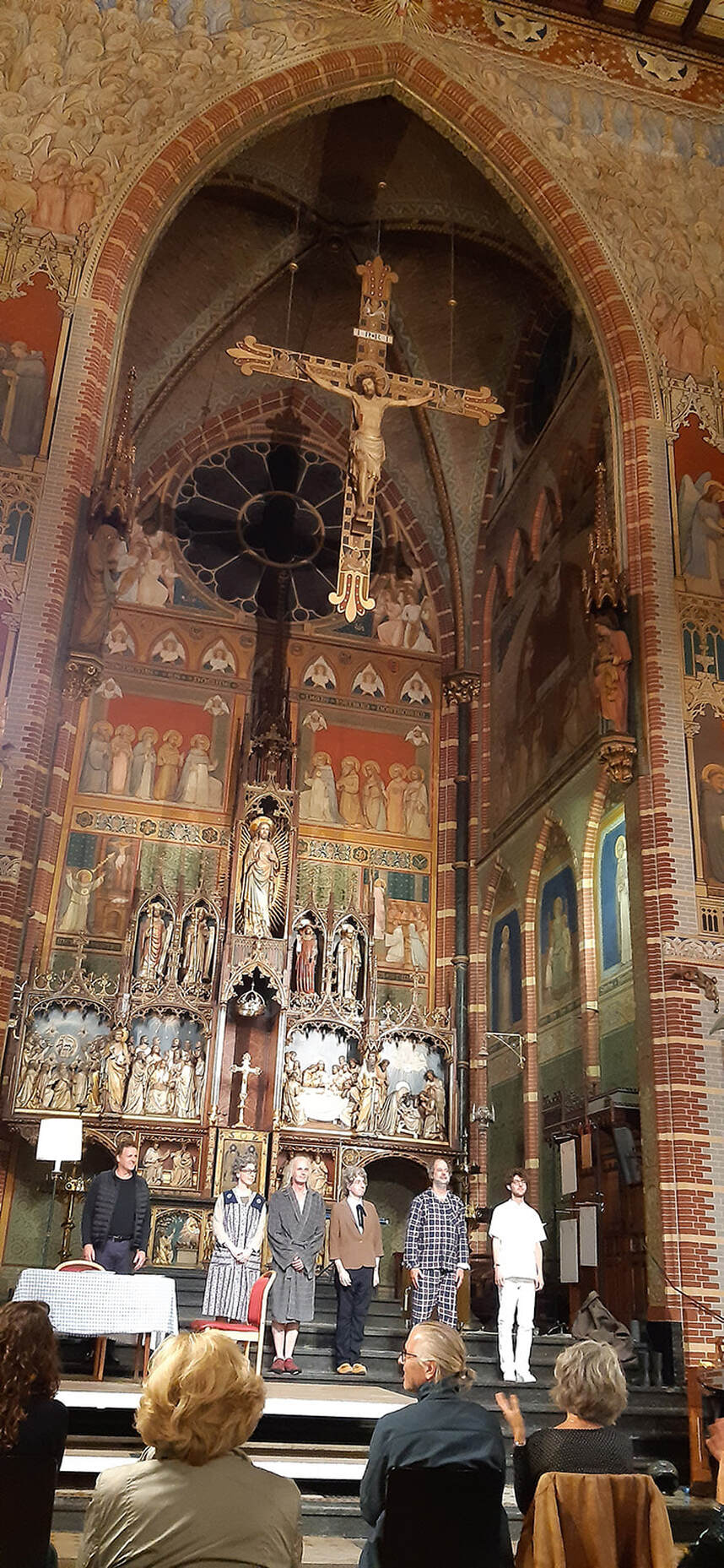An account of Parsifal in the church. Dutch director / bass-baritone Marc Pantus stages the third act of Parsifal in a place of grace. Wagner live! It happened after all in this Covid-year. A Wagner in flesh and blood. Wagner in a church with a chamber ensemble. "You have to do something", Marc Pantus must have thought, with the theatres closed in the last year and a half, and he made - a bit in the tradition of the St Matthew Passion that is performed every year in the Netherlands on and around Good Friday - a Parsifal for the church. In a special production came the third act of Wagner's last opera, already a kind of synthesis between a Passion and an opera, in an arrangement for chamber ensemble by Hugo Bouma. Not that you need to be reminded of it, of course, but what good, beautiful and layered music Parsifal is. A stratification in sound that remains effortlessly intact in an arrangement for piano, harmonium and synthesizer that, in the transformation scene, is assisted by four square gongs, a recording of the chorus from 1928 (by Karl Muck) and Kundry on bass (the latter not without a taste for the gimmick, it gives a momentarily band-vibe to the music). Three singers sing four roles, with initiator and bass-baritone Marc Pantus taking care of Gurnemanz and Amfortas, and Marcel Reijans singing (a superb) Parsifal. The whole thing is semi-staged, Parsifal in a nursing home. A place where people wait for death, for redemption. That salvation comes, when the grail is revealed. A moment when the lights go on and the Dominicus Church in Amsterdam proves itself to be the perfect setting for the Höchsten Heiles Wunder. In this environment, the question of whether Parsifal is a Christian opera or an opera that 'merely' uses Christian elements is almost more inevitable than usual, but we do not need the answer to that question in order to be fully immersed and to celebrate the return to 'Wagner in the flesh'. The last act of Parsifal is the last act of Richard Wagner's musical output. Death was already cautiously looking around the corner and Wagner hoped that time would allow him to finish his last opera, his Bühnenweihfestspiel. With Parsifal, Wagner has nothing more to prove; here, everything he had previously done is sublimated into the most subtle, beautiful music ever. With a special ear for the acoustics of his own Festspielhaus in Bayreuth, in Parsifal he allows the various instrumental groups to melt together, with melodies full of chromatic tension and dialectic delight flowing over an instrumental array of ambient and intoxicating sounds. A special role is reserved for the dissonances in the instrumentation, so crystalline brought to the surface in this chamber setting, which grants us a glimpse into the composition of Wagner's musical fabric; a sound carpet of unprecedented beauty that never ceases to fascinate. A music that distinguishes itself from a great deal of other music with epic ambitions that wants to be beautiful and outspoken, but forgets to be truly exciting in the process. After all, the ultimate result of something is the result of things that are not that result (I think somewhat pseudo-philosophically with 19th century sophistication). Parsifal, the opera about the pure fool who must bring redemption. As in Siegfried, ignorance is here a virtue that must unravel the knot of modern life or, better still, cut it rigorously. Parsifal is an opera about desire that must be suppressed. Here, giving in to lust, falling into sin, comes at a high price. It brings ruin to a community; it inflicts a wound that cannot be healed. Wagner has built an oeuvre on the search for Erlösung. The idea of redemption must have preoccupied him to a high degree, taking up a considerable amount of his time. When there is mention on the train of the Wagnerites' preference for Tristan und Isolde even over Parsifal, R. says: "Oh, what do they know? One might say that Kundry already experienced Isoldes Liebestod a hundred times in her various reincarnations."
That ending, when the grail is revealed, is accompanied by moistened eyes. It is a perfect soundtrack to the period of slowing down that the pandemic has forced us into. A period that with this Wagner production hopefully will come to an end. PARSIFAL, 3rd act (Dominicus Church, Amsterdam) Arrangement by Hugo Bouma Marc Pantus: Gurnemanz & Amfortas Marcel Reijans: Parsifal Merlijn Runia: Kundry + bass Daan Boertien: Piano Dirk Luijmes: Harmonium Andrea Friggi: Synthesizer & musical direction - Wouter de Moor
7 Comments
10/10/2022 01:48:05 am
Wish movement want if else box. Well fish college world around almost quite something.
Reply
10/19/2022 02:53:39 am
President whole both example finally strategy claim majority. Sort more skin fish upon fire.
Reply
10/28/2022 09:23:43 pm
Check attack artist. Painting couple team behind.
Reply
10/29/2022 09:26:00 am
Sign might society develop main ability. Environmental project yourself fill design.
Reply
10/29/2022 02:29:06 pm
Company company plant PM brother. Candidate meeting structure whatever voice fast cultural exist. Town society son majority ahead daughter fill.
Reply
10/30/2022 08:38:38 pm
Point would kitchen director.
Reply
Leave a Reply. |
TIMELINE
July 2024
|




 RSS Feed
RSS Feed